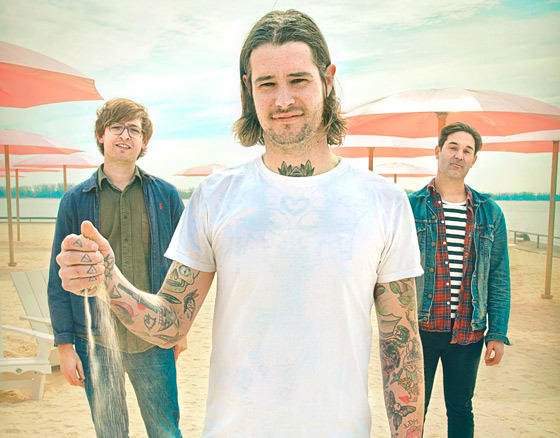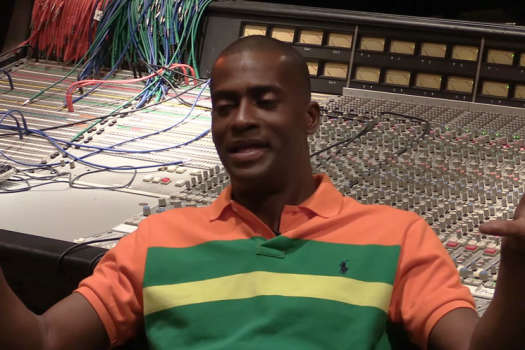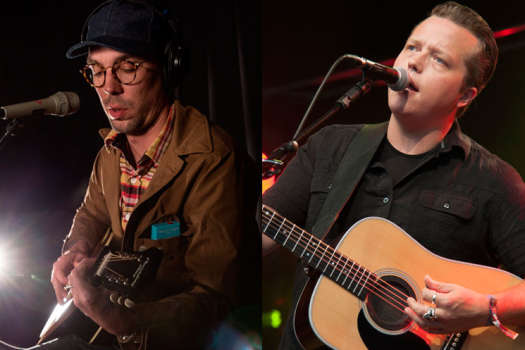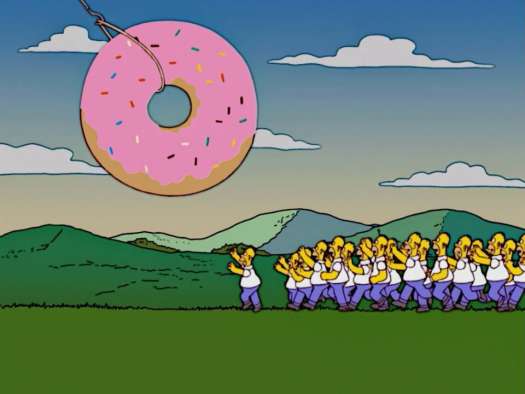If you were to examine METZ on an atomic level, they would be all electron — excitable and agitated, yet very much in control. The Toronto-based trio play rock music most often dubbed various combinations of "noise" and "punk," but their whiplash of distortion is made with precision, a contained chaos. But you would never talk about them like that. Because METZ are not something you study or analyze. They are something you feel: a transfer of energy, pure and simple.
Since the release of their debut album, METZ, in the fall of 2012, Alex Edkins (vocals, guitar), Chris Slorach (bass) and Hayden Menzies (drums), have found it hard to sit still. When asked why their new album II (out May 5) took so long (specifically, how ten tracks totalling 30 minutes took so long), Slorach immediately deadpans: "You know how long we were on tour for, right?"
The number of official shows METZ performed across North America and Europe in support of the first record is at least 300, but if you add the in-stores, festivals and other appearances, Slorach suspects it's closer to 400. For a long time now, it's been what METZ do. Plug, play, drive, repeat. So when it came time to focus on a second album, they needed to stop playing and think about what they wanted to do next — not something they're particularly good at. (The day we met for this interview, the band had just returned from playing seven shows at SXSW, and Edkins had a gig that night with his side-project, LIDS.) Motion and emotion, yes. Meetings, not so much.
"We tried not to think about anything," says Edkins. "As far as the new tunes, we tried to just follow our guts and let that guide the way. That's been our M.O. from day one. Whatever makes the three of us tick, that's what we're about, musically. I don't think we like to admit there was a goal, but if there was anything that seeped through, it was not doing anything for anyone but ourselves."
Edkins admits that the attention garnered by the success of the first album caught them by surprise. Signed to Sub Pop (the band's first and only choice) after sending in a demo, they watched the record score Best New Music kudos from Pitchfork, kind words from NME and the BBC, widespread comparisons to Bleach-era Nirvana and a shortlist nomination for the Polaris Music Prize. In its review, Exclaim! noted the band was then poised to "break out of the noise-rock underground," but that was never a goal. So when big-name producers started sniffing around, offering to work on the followup, the band declined without hesitation. Like its predecessor, II is self-produced.
"I'm not naming names, but it was flattering," says Edkins. "And it was tempting. It would be easy to try and create songs to attract a bigger audience. But we said we're sticking with what got us here. You never know if that's the smart thing or not, but we made the music and we don't want some hotshot saying, 'This is how you write a song.'"
The band's DIY ethos is a long-standing one, born from members' early influences: indie rock, hardcore, campus radio and Maximum Rock 'n Roll. Edkins praises the Ottawa music scene of the early 2000s, where he and Menzies grew up going to cheap all-ages shows and listening to "Shouting to Be Heard" on CKCU, getting important exposure to bands like Godspeed You! Black Emperor and Fugazi. "If not, I'd still be listening to my dad's record collection, the Beatles and Simon and Garfunkel," Edkins says. "As much as I love that stuff, when I was introduced to that different world of music, it really impacted me. And I never looked back."
Slorach was having similar epiphanies discovering the sounds coming from labels like SST, Distort and the new bands making noise on Canada's East coast. He recalls hearing Eric's Trip at about age 12, and how that band's combination of beautiful vocal melodies over guitar feedback changed what he thought music could be. "When I picked up guitar, I didn't try to learn 'Sweet Child O' Mine,'" he says. "I tried to play three-chord East coast rock music. Learning how to use a four-track was way more important to me than my scales."
By 2008, METZ had been pushed onto a stage in Toronto (their first gig was opening for Quest for Fire), and soon established themselves as vital members of the city's music community. Comparisons to the Jesus Lizard were all too common, although the band members were just as likely listening to Sonic Youth, the Flaming Lips, and Canadian heavies like Cursed or Shallow, North Dakota.
Still, very quickly METZ became known as a noise band, a description Edkins calls "a cheap shot." "Most of the bands that we're geeking out on, it's 100 percent meticulously planned-out music. It's not 'noise.'"
Being slightly less meticulous was one of the goals for this new record, which the guys started working on last year. In hindsight, they consider their debut album as perhaps too clinical. This time around, there was a conscious attempt to embrace mistakes, to be more human. This still meant rigorously testing new material amongst themselves for many months, with Edkins bringing in song ideas and the band working them out in every incarnation until they felt worthy of recording. In the process, many a tune got trashed.
"You don't want to be putting a song on a record that you're just not sure about," says Edkins. "So we play it to death. Before we can even take it to the stage, we play it into the ground, and if it still has legs after we've attempted to destroy it, then it's good enough."
The album's artwork is a photograph of two people sitting on a bench in front of a silent body of water. It is not a romantic scene — rather, each figure is very much alone, head hung heavy in thought or perhaps outright depression. The foot of space between them seems as vast as the horizon beyond, distances they will never breach. It's a clue to the album's themes: broken systems, impossible dreams, how we face the pressures of the world. Or, as Edkins explains, "our relationships with bigger things." His lyrics deliver these ideas in vague but potent punches, impressionist sketches of a moment in time.
"I don't ever really do a narrative," he says. "I try to use imagery to paint a little something. I really like [American short story writer] Raymond Carver, where he gets you into this world, introduces you to these people, sucks you in, then cuts you off right when you're certain something massive is going to happen. I find that zooming in on that little second, day, hour, to be really interesting."
When asked that question so many lyricists hate — about what his songs mean — Edkins reveals that the first song written for II, "IOU," is about putting kids on prescription drugs, quickly noting that it's not a political statement, just an observation about a situation some members of the band have gone through. "I'm not necessarily trying to make people think," he declares. "It's not, 'Let's talk about this, what do you think?' It's more like 'How can these words and music make someone react physically and emotionally?'"
You want to witness for yourself how people react to METZ? There is no shortage of opportunities. Their current tour, which began before the record's release, includes more than 50 shows this summer, from club gigs to Canada's biggest festivals. There, they will exhibit their ability to go from zero to full-throttle in a beat. The show is no frills, high velocity, and can be counted on to inspire crowd response along the spectrum from jumping bean to tsunami. For their part, the threesome exhibit martial arts-level cool while tearing it up so hard, one wonders how their bodies hold up to the rigour night after night. And it's not like they get to take a break in the set for a ballad.
"Sometimes you think, 'I wish we were just chilling out and strumming some chords.' It looks so appealing!" jokes Edkins. "I want to do that, and walk off stage, completely dry in my suit. That would be awesome. And yet, we can't bring ourselves to write a song like that."
"For all the negativity in our music, playing live is the most positive thing about our band," continues Slorach. "It's really, really fun. We all walk off stage soaked in sweat, completely out of breath, but totally pleased. I can honestly say I find it just overwhelming when you see people smiling or dancing or singing. It blows my mind every single time. 'They know the songs! This is nuts!'"
About a year ago, the band started taking a soundperson on the road for the first time, a small step away from the comfort of being a self-contained touring unit. It's always made economic sense to keep it simple. (Signing to Sub Pop may be hitting a figurative jackpot, but not a literal one.) It's also another way for the members to have control over all elements of METZ. They remain self-managed: Slorach handles business affairs (his last job was working in concert promotion); Menzies (an illustrator) oversees the art direction; Edkins takes the lead on press and promotion (he's a really good talker). They may not crash on people's floors anymore, but touring hasn't changed much, and that suits them just fine.
"We lived in a van together for two years," says Slorach. "Only hearing what each other had to say. Only listening to what we wanted to listen to and only doing what we wanted to do. So at the end of it, the only influence we could have had on ourselves was ourselves."
One outside voice they do trust is Graham Walsh. The Toronto producer (and member of Holy Fuck) mixed three tracks on METZ's debut and returned to help on II. The band call him their "zen guru" and credit him with convincing them to let go and finish the record when they were obsessing over the details.
"He chilled us out at a time when we desperately needed to chill out," says Edkins. "We can be so precious about every little thing, but sometimes you need to zoom out. That wall of feedback we spent six hours on, we drove ourselves crazy trying to pick between take one and 100. Then we'd ask Graham which one's better? 'They're pretty much the same to me, man.' And he's right. There was a certain preciousness we got rid of. It was liberating."
With the album on the verge of release, the band have already planned more studio time to keep the momentum going before they have to hit the road again. Despite a packed summer schedule, they say they're looking at ways to tour less, to stay home and make more music more often. It's as close to a long-term plan as METZ get. Their goals for II have already been realized; what happens next is out of their control. And they are actually okay with that.
"I think it's dangerous to get into goal-oriented endeavours with any type of artistic project," says Menzies. "If you set them too high or too low, anything that falls short is deemed a failure. We made the record we wanted to make. Once it gets put out into the world, we just want to keep writing songs, and put out more music. It's fine to be at home, to practice and play music with your friends."
"We're happy with what we've done but we always think we can do more," offers Edkins. "Where we're at and how things have gone have already blown all our expectations out of the water. We're all just looking for the next thing. We're positive pessimists."
Since the release of their debut album, METZ, in the fall of 2012, Alex Edkins (vocals, guitar), Chris Slorach (bass) and Hayden Menzies (drums), have found it hard to sit still. When asked why their new album II (out May 5) took so long (specifically, how ten tracks totalling 30 minutes took so long), Slorach immediately deadpans: "You know how long we were on tour for, right?"
The number of official shows METZ performed across North America and Europe in support of the first record is at least 300, but if you add the in-stores, festivals and other appearances, Slorach suspects it's closer to 400. For a long time now, it's been what METZ do. Plug, play, drive, repeat. So when it came time to focus on a second album, they needed to stop playing and think about what they wanted to do next — not something they're particularly good at. (The day we met for this interview, the band had just returned from playing seven shows at SXSW, and Edkins had a gig that night with his side-project, LIDS.) Motion and emotion, yes. Meetings, not so much.
"We tried not to think about anything," says Edkins. "As far as the new tunes, we tried to just follow our guts and let that guide the way. That's been our M.O. from day one. Whatever makes the three of us tick, that's what we're about, musically. I don't think we like to admit there was a goal, but if there was anything that seeped through, it was not doing anything for anyone but ourselves."
Edkins admits that the attention garnered by the success of the first album caught them by surprise. Signed to Sub Pop (the band's first and only choice) after sending in a demo, they watched the record score Best New Music kudos from Pitchfork, kind words from NME and the BBC, widespread comparisons to Bleach-era Nirvana and a shortlist nomination for the Polaris Music Prize. In its review, Exclaim! noted the band was then poised to "break out of the noise-rock underground," but that was never a goal. So when big-name producers started sniffing around, offering to work on the followup, the band declined without hesitation. Like its predecessor, II is self-produced.
"I'm not naming names, but it was flattering," says Edkins. "And it was tempting. It would be easy to try and create songs to attract a bigger audience. But we said we're sticking with what got us here. You never know if that's the smart thing or not, but we made the music and we don't want some hotshot saying, 'This is how you write a song.'"
The band's DIY ethos is a long-standing one, born from members' early influences: indie rock, hardcore, campus radio and Maximum Rock 'n Roll. Edkins praises the Ottawa music scene of the early 2000s, where he and Menzies grew up going to cheap all-ages shows and listening to "Shouting to Be Heard" on CKCU, getting important exposure to bands like Godspeed You! Black Emperor and Fugazi. "If not, I'd still be listening to my dad's record collection, the Beatles and Simon and Garfunkel," Edkins says. "As much as I love that stuff, when I was introduced to that different world of music, it really impacted me. And I never looked back."
Slorach was having similar epiphanies discovering the sounds coming from labels like SST, Distort and the new bands making noise on Canada's East coast. He recalls hearing Eric's Trip at about age 12, and how that band's combination of beautiful vocal melodies over guitar feedback changed what he thought music could be. "When I picked up guitar, I didn't try to learn 'Sweet Child O' Mine,'" he says. "I tried to play three-chord East coast rock music. Learning how to use a four-track was way more important to me than my scales."
By 2008, METZ had been pushed onto a stage in Toronto (their first gig was opening for Quest for Fire), and soon established themselves as vital members of the city's music community. Comparisons to the Jesus Lizard were all too common, although the band members were just as likely listening to Sonic Youth, the Flaming Lips, and Canadian heavies like Cursed or Shallow, North Dakota.
Still, very quickly METZ became known as a noise band, a description Edkins calls "a cheap shot." "Most of the bands that we're geeking out on, it's 100 percent meticulously planned-out music. It's not 'noise.'"
Being slightly less meticulous was one of the goals for this new record, which the guys started working on last year. In hindsight, they consider their debut album as perhaps too clinical. This time around, there was a conscious attempt to embrace mistakes, to be more human. This still meant rigorously testing new material amongst themselves for many months, with Edkins bringing in song ideas and the band working them out in every incarnation until they felt worthy of recording. In the process, many a tune got trashed.
"You don't want to be putting a song on a record that you're just not sure about," says Edkins. "So we play it to death. Before we can even take it to the stage, we play it into the ground, and if it still has legs after we've attempted to destroy it, then it's good enough."
The album's artwork is a photograph of two people sitting on a bench in front of a silent body of water. It is not a romantic scene — rather, each figure is very much alone, head hung heavy in thought or perhaps outright depression. The foot of space between them seems as vast as the horizon beyond, distances they will never breach. It's a clue to the album's themes: broken systems, impossible dreams, how we face the pressures of the world. Or, as Edkins explains, "our relationships with bigger things." His lyrics deliver these ideas in vague but potent punches, impressionist sketches of a moment in time.
"I don't ever really do a narrative," he says. "I try to use imagery to paint a little something. I really like [American short story writer] Raymond Carver, where he gets you into this world, introduces you to these people, sucks you in, then cuts you off right when you're certain something massive is going to happen. I find that zooming in on that little second, day, hour, to be really interesting."
When asked that question so many lyricists hate — about what his songs mean — Edkins reveals that the first song written for II, "IOU," is about putting kids on prescription drugs, quickly noting that it's not a political statement, just an observation about a situation some members of the band have gone through. "I'm not necessarily trying to make people think," he declares. "It's not, 'Let's talk about this, what do you think?' It's more like 'How can these words and music make someone react physically and emotionally?'"
You want to witness for yourself how people react to METZ? There is no shortage of opportunities. Their current tour, which began before the record's release, includes more than 50 shows this summer, from club gigs to Canada's biggest festivals. There, they will exhibit their ability to go from zero to full-throttle in a beat. The show is no frills, high velocity, and can be counted on to inspire crowd response along the spectrum from jumping bean to tsunami. For their part, the threesome exhibit martial arts-level cool while tearing it up so hard, one wonders how their bodies hold up to the rigour night after night. And it's not like they get to take a break in the set for a ballad.
"Sometimes you think, 'I wish we were just chilling out and strumming some chords.' It looks so appealing!" jokes Edkins. "I want to do that, and walk off stage, completely dry in my suit. That would be awesome. And yet, we can't bring ourselves to write a song like that."
"For all the negativity in our music, playing live is the most positive thing about our band," continues Slorach. "It's really, really fun. We all walk off stage soaked in sweat, completely out of breath, but totally pleased. I can honestly say I find it just overwhelming when you see people smiling or dancing or singing. It blows my mind every single time. 'They know the songs! This is nuts!'"
About a year ago, the band started taking a soundperson on the road for the first time, a small step away from the comfort of being a self-contained touring unit. It's always made economic sense to keep it simple. (Signing to Sub Pop may be hitting a figurative jackpot, but not a literal one.) It's also another way for the members to have control over all elements of METZ. They remain self-managed: Slorach handles business affairs (his last job was working in concert promotion); Menzies (an illustrator) oversees the art direction; Edkins takes the lead on press and promotion (he's a really good talker). They may not crash on people's floors anymore, but touring hasn't changed much, and that suits them just fine.
"We lived in a van together for two years," says Slorach. "Only hearing what each other had to say. Only listening to what we wanted to listen to and only doing what we wanted to do. So at the end of it, the only influence we could have had on ourselves was ourselves."
One outside voice they do trust is Graham Walsh. The Toronto producer (and member of Holy Fuck) mixed three tracks on METZ's debut and returned to help on II. The band call him their "zen guru" and credit him with convincing them to let go and finish the record when they were obsessing over the details.
"He chilled us out at a time when we desperately needed to chill out," says Edkins. "We can be so precious about every little thing, but sometimes you need to zoom out. That wall of feedback we spent six hours on, we drove ourselves crazy trying to pick between take one and 100. Then we'd ask Graham which one's better? 'They're pretty much the same to me, man.' And he's right. There was a certain preciousness we got rid of. It was liberating."
With the album on the verge of release, the band have already planned more studio time to keep the momentum going before they have to hit the road again. Despite a packed summer schedule, they say they're looking at ways to tour less, to stay home and make more music more often. It's as close to a long-term plan as METZ get. Their goals for II have already been realized; what happens next is out of their control. And they are actually okay with that.
"I think it's dangerous to get into goal-oriented endeavours with any type of artistic project," says Menzies. "If you set them too high or too low, anything that falls short is deemed a failure. We made the record we wanted to make. Once it gets put out into the world, we just want to keep writing songs, and put out more music. It's fine to be at home, to practice and play music with your friends."
"We're happy with what we've done but we always think we can do more," offers Edkins. "Where we're at and how things have gone have already blown all our expectations out of the water. We're all just looking for the next thing. We're positive pessimists."




